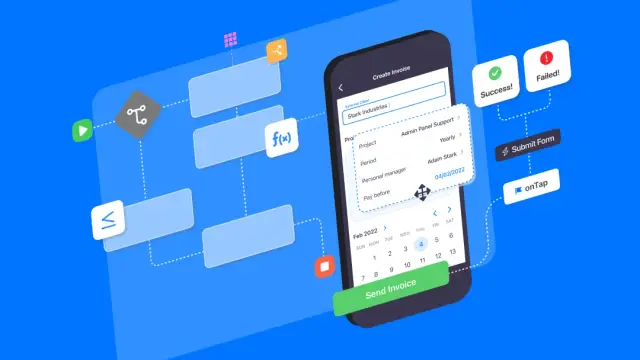The Benefits of Using a No-Code Platform to Customize Your Electronic Health Records (EHR) System
Explore how no-code platforms revolutionize Electronic Health Records customization, offering flexibility, efficiency, and scalability for healthcare providers, even without coding expertise.

Introduction to No-Code Platforms and EHR Customization
In recent years, the demand for efficient and flexible healthcare solutions has been on the rise, leading many healthcare providers to seek innovative ways to enhance their Electronic Health Records (EHR) systems. The advent of technology has brought about substantial transformation across various sectors, including healthcare, where digital solutions are rapidly replacing traditional paper-based systems. Among these transformative technologies, no-code platforms have emerged as a game-changing solution for creating, customizing and maintaining sophisticated healthcare applications.
No-code platforms empower users to build and modify software applications without the need for traditional programming skills. By utilizing visual-based interfaces, such as drag-and-drop features and pre-built templates, these platforms make it possible for individuals with limited technical expertise to create complex applications swiftly and efficiently. This democratization of software development is particularly significant in the customization of EHR systems, allowing healthcare providers to tailor solutions to their specific organizational needs and enhance their operational efficiencies.
Electronic Health Records are digital versions of patients' paper charts. They provide real-time, patient-centered records that make information available instantly and securely to authorized users. Effective EHR systems streamline communication between healthcare professionals, improve patient care, and support regulatory compliance. However, the complexity and varied needs of healthcare organizations mean that off-the-shelf EHR solutions often fall short of meeting specific requirements, leading to a demand for customization.
No-code platforms allow healthcare professionals to customize EHR systems without relying on specialized developers. This capability not only accelerates the customization process but also significantly reduces associated costs.
The flexibility of no-code platforms in EHR customization means healthcare providers can easily integrate new features and respond dynamically to regulatory changes or advances in medical practices. Furthermore, no-code solutions enable healthcare personnel to engage and collaborate more effectively in the development process, leading to solutions that more accurately reflect the needs and workflows of their organization.
In conclusion, the integration of no-code platforms into the customization of EHR systems marks a significant advancement in healthcare IT. By offering a pathway for healthcare providers to efficiently customize and optimize their systems, no-code platforms are revolutionizing the way Electronic Health Records are managed and utilized, leading to better patient outcomes and more streamlined healthcare operations.
Enhanced Flexibility in EHR Customization
The healthcare industry is synonymous with the ever-evolving landscape of patient needs, regulatory requirements, and technological advancements. In this dynamic environment, Electronic Health Record (EHR) systems must evolve to meet these changing demands. No-code platforms offer an unparalleled solution to provide flexibility in EHR customization, enabling healthcare providers to efficiently adapt their systems according to specific organizational needs.
Empowering Non-Technical Users
No-code platforms revolutionize the EHR customization process by democratizing application development. Even those without extensive technical expertise can design and modify applications tailored to their specific workflows. This user empowerment enables healthcare providers to quickly iterate on system changes without depending on traditional IT teams or software developers, resulting in more agile healthcare operations.
Customizable Workflow Automation
One of the core benefits of leveraging a no-code platform is the ability to easily automate and reconfigure workflow processes in EHR systems. Healthcare providers can design workflows that mirror their unique operational procedures, integrating tasks such as patient data entry, lab results management, and billing processes. This level of customization enables enhanced patient care while minimizing administrative burdens, ultimately leading to increased productivity and satisfaction among healthcare staff.
Integrating Diverse Systems Effortlessly
EHR systems must frequently interact with various existing systems within a healthcare organization. No-code platforms provide seamless integration capabilities, allowing users to connect their customized EHR systems with other healthcare applications and databases effortlessly. This interoperability ensures that vital information flows smoothly across the organization, enhancing clinical decision-making and patient outcomes.
Rapid Adaptation to Regulatory Changes
The healthcare industry is subject to stringent regulatory requirements that frequently change. No-code platforms enable healthcare providers to rapidly adjust their EHR systems to comply with these updates. By providing intuitive visual interfaces for system modifications, organizations can implement required changes in less time compared to traditional coding methods, reducing the risk of non-compliance and associated penalties.
The Role of AppMaster in Flexibility and Customization
AppMaster, a leading no-code platform, exemplifies the potential of such solutions in enhancing flexibility for EHR customization. By enabling users to visually create data models and business processes, AppMaster streamlines the design of complex EHR workflows. The platform facilitates seamless integration with PostgreSQL-compatible databases, ensuring scalability and fluidity in data management, crucial for high-performance healthcare environments.
Moreover, AppMaster provides users the ability to modify applications comprehensively, reflecting any changes in organizational workflows or regulatory demands. Such adaptability offers a significant edge for healthcare providers seeking to maintain competitive and compliant operations. With AppMaster, they can achieve this with ease, empowering them to focus on what truly matters — delivering exceptional patient care.

Improving Efficiency with No-Code Solutions
The advent of no-code platforms has radically transformed how organizations approach software development, notably enhancing efficiency across various industries — healthcare included. In the realm of Electronic Health Records (EHR) systems, these platforms have become invaluable tools for healthcare providers seeking to optimize their operations without the cumbersome requirements of traditional software development.
One of the primary ways no-code solutions enhance efficiency is by significantly reducing the time required to develop and deploy customized EHR systems. Traditional development involves complex coding, necessitating prolonged cycles to build, test, and implement solutions. In contrast, no-code platforms utilize visual interfaces and drag-and-drop features, enabling even those without technical expertise to create and modify applications swiftly. This rapid development cycle ensures that healthcare providers can implement changes and improvements in real-time, allowing them to respond swiftly to evolving needs and regulatory requirements.
Furthermore, no-code platforms facilitate efficient process automation within EHR systems. By enabling the creation of workflows that automate routine and repetitive tasks, healthcare providers can minimize manual intervention, significantly reducing the potential for human error and freeing up valuable staff time. This automation extends to functions such as patient data entry, appointment scheduling, billing, and reporting, allowing healthcare staff to focus more on patient care and less on administrative tasks.
The ability to quickly adapt and scale applications is another efficiency-driven benefit of no-code platforms. As healthcare practices grow or change, their systems must be able to scale accordingly. No-code platforms make this possible by providing the tools to effortlessly adjust features and expand capabilities without traditional development bottlenecks. This adaptability ensures that healthcare providers can maintain efficient service delivery even as their operational size or patient volume increases.
No-code platforms also integrate seamlessly with existing healthcare systems and technologies, further enhancing operational efficiency. This interoperability reduces data silos, allowing for convenient data sharing and communication across different departments or facilities. Health professionals can access and exchange information more easily, leading to better-informed decisions and faster patient care.
Lastly, the overall cost-saving aspect of no-code platforms indirectly contributes to improved efficiency. By reducing the reliance on specialized IT personnel and cutting down lengthy development cycles, no-code solutions lower operational costs. These savings can be reinvested in other areas such as staff training, healthcare technology upgrades, or patient services, ultimately leading to more streamlined and efficient healthcare delivery.
Scalability and Cost-Effectiveness in Healthcare Systems
The integration of no-code platforms into Electronic Health Records (EHR) systems represents a strategic approach to achieving scalability and cost-effectiveness. Both attributes are crucial for healthcare providers aiming to enhance their operational capabilities, tackle increasing data volumes, and address the ever-growing demands of patient care. By offering a simplified development process, no-code platforms enable healthcare organizations to build and modify applications quickly, cost-effectively, and without technical barriers.
Unmatched Scalability
The scalability advantages of no-code platforms are profound, particularly for healthcare institutions facing unpredictable or seasonal increases in patient data or service demand. Traditional coding methods require detailed planning and often costly maintenance when scaling solutions to meet new demands. In contrast, applications developed on no-code platforms can rapidly adapt.
An inherent benefit of no-code solutions is their ability to regenerate applications from scratch every time you modify requirements, ensuring there’s no technical debt over time. This approach allows organizations to scale effortlessly without the complications typically associated with legacy systems.
No-code platforms often leverage microservices architecture, enabling scalability at a granular level. This means each component of an EHR system can be expanded independently, providing seamless scalability aligned with specific needs like expanding a patient management module or enhancing reporting capabilities.
Cost-Effectiveness Unleashed
Cost has always been a pivotal consideration in healthcare IT management. By employing no-code platforms, institutions can drastically reduce the costs associated with traditional software development, such as hiring a team of developers or investing in extensive training for existing personnel. With drag-and-drop interfaces and visual business process designers, healthcare providers can focus resources on other critical areas while minimizing expenditure on development services.
The time saved through no-code development translates directly to financial savings. Projects that traditionally span months can often be completed in weeks or even days, resulting in significant reductions in total project costs and quicker time-to-market. These efficiencies are particularly valuable in the healthcare sector, where adopting new technology can lead to immediate improvements in patient care and organizational efficiency.
Future-Proofing Healthcare Operations
No-code platforms also offer a future-proofing advantage, which is pivotal in a rapidly evolving healthcare environment. The process of iterating on EHR systems to incorporate innovations, new regulatory requirements, or patient service enhancements becomes less burdensome. By utilizing no-code tools capable of ongoing, swift adjustments, healthcare organizations ensure that their IT infrastructure remains relevant and responsive to modern demands.
In conclusion, the adoption of no-code platforms positions healthcare systems to achieve unparalleled scalability and cost-effectiveness. By lowering the barrier to application development, these platforms empower healthcare organizations to optimize their EHR systems efficiently, ensuring readiness for future challenges and changes within the healthcare landscape.
Ensuring Security and Compliance
In the realm of healthcare, ensuring security and compliance is paramount. Electronic Health Records (EHR) systems house sensitive patient data that necessitates stringent protection and adherence to healthcare regulations. Adopting a no-code platform for EHR customization can enhance both security and compliance efforts, providing healthcare providers with a reliable solution to manage their data responsibly.
Security Measures in No-Code Platforms
No-code platforms emphasize robust security measures designed to safeguard sensitive health data. These platforms incorporate advanced encryption techniques to protect data at rest and during transmission. Additionally, user authentication controls, such as multi-factor authentication, restrict unauthorized access and ensure that only authorized personnel can access critical information.
Compliance with Healthcare Regulations
Compliance with healthcare regulations such as HIPAA (Health Insurance Portability and Accountability Act) is non-negotiable for any EHR system. No-code platforms facilitate adherence to these regulations by providing built-in compliance features. They offer comprehensive audit trails that monitor and log all system activities, thus enhancing accountability and traceability.
Furthermore, no-code platforms streamline compliance through automated workflows that ensure data integrity and standardize adherence protocols. By offering role-based access and permissions, these platforms maintain strict controls over data visibility and manipulation.
Data Sovereignty and Control
No-code platforms empower healthcare providers with data sovereignty and control. With options to deploy applications on-premises or on private clouds, healthcare organizations can dictate where their data is stored and how it is managed. This flexibility aligns with compliance mandates that govern data residency and protection laws in different jurisdictions.
In conclusion, leveraging a no-code platform for EHR customization provides healthcare providers with a security-enhanced pathway to managing patient data while remaining compliant with healthcare regulations.
Challenges and Considerations
While no-code platforms offer a wealth of advantages in customizing Electronic Health Records (EHR) systems, there are some challenges and considerations to bear in mind as healthcare providers embark on this technological journey.
Integration Complexity
Integrating no-code solutions into existing healthcare infrastructures can pose significant challenges. Compatibility with legacy systems remains a major concern, especially for larger healthcare organizations. Ensuring seamless interoperability between new no-code applications and existing data systems is vital. You should ensure that your chosen platform offers robust integration capabilities and supports various data exchange formats such as HL7 and FHIR.
User Adoption and Training
The adoption of new technologies often requires substantial change management efforts. Healthcare professionals who are accustomed to traditional EHR systems may find transitioning to no-code solutions challenging. Successful implementation hinges on comprehensive user training and support to facilitate a smooth transition. Stakeholders should invest in tailored training programs to equip users with the necessary skills and knowledge to make the most of no-code platforms.
Data Security and Compliance
Given the sensitivity of patient data, maintaining robust security measures is paramount. No-code platforms must comply with healthcare regulations such as HIPAA and ensure that data security is meticulously maintained.

Customization Limitations
Although no-code platforms allow for substantial customization, there may be instances where specific custom functionalities are required that exceed the capabilities of a given platform. Providers need to evaluate whether a chosen solution aligns with their unique requirements and assess whether any compromises are necessary. Careful research and consultation with platform developers can identify potential limitations and inform decision-making.
Scalability Concerns
While no-code platforms promise scalability, it’s essential to ensure the selected platform can support the growth and evolution of your healthcare services. Considering the potential need for horizontal scaling — such as expanding across new specialties or incorporating additional patient data — will help ensure an EHR system that evolves alongside your organization’s goals.
Cost Implications
While initial costs might be reduced, total cost considerations should account for aspects such as subscription fees, potential training costs, and any additional expenses related to integration and customization. Weighing the cost benefits against these potential outlays will help healthcare providers make informed budget allocations.
Vendor Lock-In
The risk of vendor lock-in arises if a provider becomes overly reliant on a single no-code platform provider. Selecting a platform that encourages data portability and flexibility to switch vendors can mitigate this risk. Providers should inquire about export options and the ability to migrate data and processes if needed.
By understanding and addressing these challenges proactively, healthcare providers can successfully harness the transformative potential of no-code platforms to customize their EHR systems, ensuring a seamless and efficient experience for both healthcare professionals and patients alike.
Conclusion
Incorporating no-code platforms into the healthcare sector for Electronic Health Records (EHR) system customization represents a major leap forward for medical providers and patients alike. These platforms bridge the gap between technological complexity and practical requirements, ensuring that EHR systems are not only tailored to fit specific needs but are also adaptable for future changes. By removing the requirement for extensive coding knowledge, no-code platforms empower healthcare professionals to take charge of their digital solutions, enhancing overall efficiency and communication within medical environments.
The benefits of implementing no-code platforms are multifaceted. They offer a path to fast and cost-effective development, allowing seamless integration with existing systems, thereby optimizing workflows and minimizing disruptions. The capacity to continually regenerate applications without creating technical debt is particularly advantageous, ensuring that healthcare providers are equipped with the most cutting-edge technology available.
Moreover, the emphasis on security and compliance with industry regulations reassures stakeholders of data confidentiality and integrity, which is paramount in the healthcare field. As the demand for personalized, efficient healthcare solutions grows, no-code platforms will play a critical role in how electronic health systems evolve and expand. By embracing this innovative approach, medical organizations can ensure that their technological resources are not only meeting current needs but are also positioned to effortlessly adapt to future advancements and regulatory changes.
FAQ
A no-code platform allows users to create software applications without writing code. It uses visual interfaces and drag-and-drop features to enable ease of use.
No-code platforms offer flexibility, speed, and cost-efficiency for customizing EHR systems, allowing healthcare providers to tailor solutions to their specific needs without coding expertise.
No-code platforms like AppMaster emphasize security and compliance with healthcare regulations like HIPAA to ensure data protection.
Yes, no-code platforms offer integration capabilities with existing healthcare systems, enabling seamless data flow and interoperability.
No-code platforms reduce development costs by eliminating the need for extensive coding expertise and long development cycles, making them a cost-effective option.
Yes, applications built on no-code platforms like AppMaster are highly scalable, enabling them to handle increased loads and data volumes common in healthcare.
No-code platforms offer extensive customization options, allowing users to tailor applications to meet specific organizational requirements and workflow processes.
Platforms like AppMaster ensure compliance with healthcare regulations such as HIPAA, offering secure and reliable solutions for medical providers.
Yes, no-code platforms are suitable for a wide range of healthcare providers, from small practices to large hospital systems, owing to their adaptability and scalability.
Absolutely, non-technical staff can use no-code platforms to customize EHR systems, thanks to the user-friendly interfaces and pre-built templates available.





